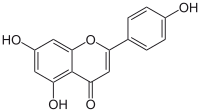Apigenin
 |
|
 |
|
| Names | |
|---|---|
|
IUPAC name
5,7-Dihydroxy-2-(4-hydroxyphenyl)-4H-1-benzopyran-4-one
|
|
| Other names
Apigenine; Chamomile; Apigenol; Spigenin; Versulin; 4′,5,7-Trihydroxyflavone; C.I. Natural Yellow 1
|
|
| Identifiers | |
|
520-36-5 |
|
| 3D model (Jmol) | Interactive image |
| ChEBI |
CHEBI:18388 |
| ChEMBL |
ChEMBL28 |
| ChemSpider |
4444100 |
| DrugBank |
DB07352 |
| ECHA InfoCard | 100.007.540 |
| 4136 | |
| KEGG |
C01477 |
| PubChem | 5280443 |
|
|
|
|
| Properties | |
| C15H10O5 | |
| Molar mass | 270.24 g·mol−1 |
| Appearance | Yellow crystalline solid |
| Melting point | 345 to 350 °C (653 to 662 °F; 618 to 623 K) |
| UV-vis (λmax) | 267, 296sh, 336 nm in methanol |
|
Except where otherwise noted, data are given for materials in their standard state (at 25 °C [77 °F], 100 kPa).
|
|
|
|
|
| Infobox references | |
Apigenin (4′,5,7-trihydroxyflavone), found in many plants, is a natural product belonging to the flavone class that is the aglycone of several naturally occurring glycosides. It is a yellow crystalline solid that has been used to dye wool.
In in vitro experiments and animal studies, a variety of potential biological activities of apigenin have been identified, but its effects on human health are unknown.
Apigenin induces autophagy (a kind of cellular waste-recycling system) in leukemia cells, which may support a possible chemopreventive role. Induced autophagy interfers with the action of the chemotherapy drug vincristine. Apigenin is a potent inhibitor of CYP2C9, an enzyme responsible for the metabolism of many pharmaceutical drugs in the body. Apigenin dimers can reverse the highest level of drug resistance found in cancer stem cells.
Apigenin has been shown to prevent renal damage caused by ciclosporin in rats, associated with reduced expression of the cell death mediator bcl-2 in histopathological sections. Ciclosporin enhances the expression of transforming growth factor-β in the rat kidney, which signifies accelerated apoptosis. Therefore, transforming growth factor-β and apoptotic index may be used to assess apigenin and its effect on ciclosporin-induced renal damage.
Apigenin acts as a monoamine transporter activator, one of the few chemicals demonstrated to possess this property. Apigenin is a ligand for central benzodiazepine receptors that competitively inhibited the binding of flunitrazepam with a Ki of 4 μM, exerting anxiolytic and slight sedative effects. Apigenin shows second-order positive modulatory activity at GABAA receptors. It has also effects on adenosine receptors and blocks NMDA receptors (IC50 = 10 μM). In addition, like various other flavonoids, apigenin has been found to possess nanomolar affinity for the opioid receptors (Ke = 410 nM, 970 nM, and 410 nM for the μ-, δ-, and κ-opioid receptors, respectively), acting as a non-selective antagonist of all three opioid receptors.
...
Wikipedia
